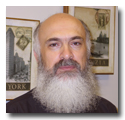Editor's Message - Dr. Zoran Vujisic
 Since June 2006, GLOSSA has promoted and published transdisciplinary research based on the notion of heterarchy. What is the link between heterarchy and transdisciplinarity? The proposition is propaedeutical. If transdisciplinarity is the approach for combining/transcending disciplines in integrative, creative, and innovative ways, then heterarchy is an investigative/heuristic metaphor and analytic framework for operationalizing and managing the approach/process. Heterarchical research systems/structures can promote scientific investigation, and process information, more effectively than hierarchical designs. In the case of GLOSSA, the extension of the concept of heterarchy to research/investigation includes the analysis of systems that can promote/encourage the capacity to conduct team science across the multi-level, multi-method, multi-layered, collaborative, and multi-disciplinary issues located in the dynamic expanse of human existence/experience related to linguistics, communications, and psychological contexts. Utilizing the framework employed by the field of management science, in which heterarchy is used as an analytical concept for research on effectiveness, GLOSSA will continue to encourage flexibility/effectiveness in (a) the ranking of disciplines, topics, and areas of interest in the consideration/evaluation of manuscripts, thereby opening avenues of research publication to a wider range of academics and scientists from across disciplines; (b) responding to conditions that require re-thinking basic theoretic and/or methodological/operational premises/assumptions that guide GLOSSA’s editorial policy; and (c) communicating changes to multiple constituencies, especially authors and peer-reviewers.
Since June 2006, GLOSSA has promoted and published transdisciplinary research based on the notion of heterarchy. What is the link between heterarchy and transdisciplinarity? The proposition is propaedeutical. If transdisciplinarity is the approach for combining/transcending disciplines in integrative, creative, and innovative ways, then heterarchy is an investigative/heuristic metaphor and analytic framework for operationalizing and managing the approach/process. Heterarchical research systems/structures can promote scientific investigation, and process information, more effectively than hierarchical designs. In the case of GLOSSA, the extension of the concept of heterarchy to research/investigation includes the analysis of systems that can promote/encourage the capacity to conduct team science across the multi-level, multi-method, multi-layered, collaborative, and multi-disciplinary issues located in the dynamic expanse of human existence/experience related to linguistics, communications, and psychological contexts. Utilizing the framework employed by the field of management science, in which heterarchy is used as an analytical concept for research on effectiveness, GLOSSA will continue to encourage flexibility/effectiveness in (a) the ranking of disciplines, topics, and areas of interest in the consideration/evaluation of manuscripts, thereby opening avenues of research publication to a wider range of academics and scientists from across disciplines; (b) responding to conditions that require re-thinking basic theoretic and/or methodological/operational premises/assumptions that guide GLOSSA’s editorial policy; and (c) communicating changes to multiple constituencies, especially authors and peer-reviewers.
In future issues, GLOSSA will take the next step in the process of conceptualization/evaluation of transdisciplinarity, bringing together, in a determined and committed effort of inclusivity, scholars from a still greater range of disciplines, thereby promoting the ideal/value of heterarchy. Hopefully, this will assist in shaping reflective substantive practices on the part of the next upsurge of transdisciplinary researchers committed to examining the human experience.
Finally, in the words of the great Poet and Orthodox Prince-Bishop of Montenegro, Petar II Petrović Njegoš:
Our lot on earth, and our destined goal,
Two sphinx-like faces we try to read.
Is this disorder or wisdom profound?
The world awakens the human will,
And purpose is achieved with knowledge sound.
Sincerely,
Dr. Zoran Vujisic
Articles
- October 2011
- March 2011
- October 2010
- March 2010
- October 2009
- December 2008
- June 2008
- December 2007
- June 2007
- December 2006
- June 2006